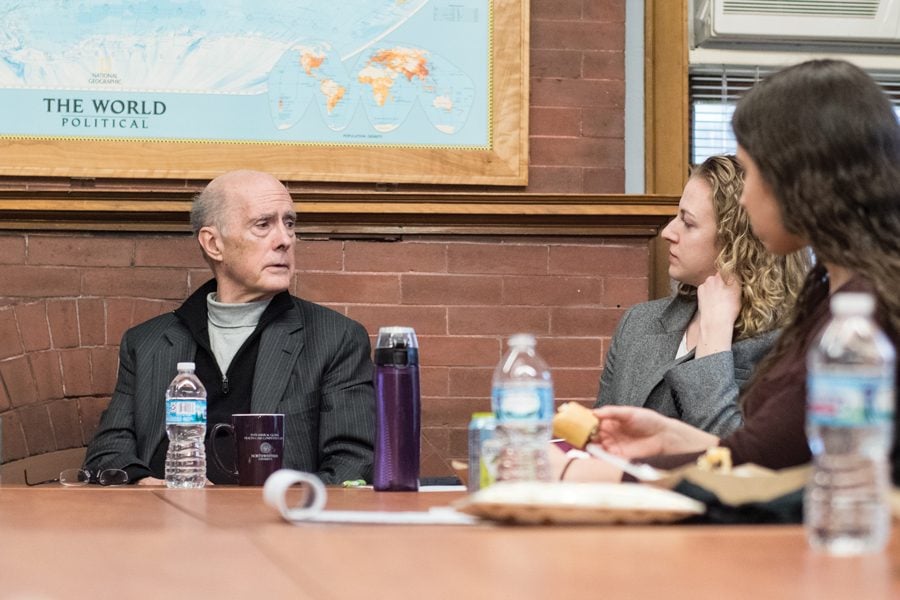Former Deputy Secretary of State talks U.S. foreign policy, relationship with Russia
Colin Boyle/Daily Senior Staffer
Former Deputy Secretary of State Strobe Talbott speaks to students Wednesday at the Buffett Institute for Global Studies. Talbott discussed the current U.S. relationship with Russia.
February 28, 2018
In a Wednesday discussion focused on the United States’ relationship with Russia, former Deputy Secretary of State Strobe Talbott said it is time for reform in Russia.
Sponsored by Northwestern University Political Union and Politics & Policy, the talk covered an area of particular expertise for Talbott, who served as deputy secretary of state during the Clinton administration. Talbott spoke to a crowd of about 40 at the Buffett Institute for Global Studies, and said the Russian government is “keeping a top on a pot that is simmering.”
“Your generation will probably bring it to a boil,” he said.
Talbott said the lack of order following the downfall of the Soviet Union led to “massive disillusionment” in Russia and a collective willingness to sacrifice freedom for order. This in turn facilitated Russia’s current circumstances under President Vladimir Putin, he said.
The country “has a lot to worry about long term,” as it will enter “a demographic and health crisis” if the basic needs of the country are left unfulfilled, Talbott said. However, Russian authorities have made it difficult for journalists to report on the persistent discontent in the country, he said.
“The line on Putin, which I think is not completely true but true enough, is that he is not a strategic thinker,” Talbott said. “He is an extremely cunning and ruthless tactician.”
Talbott first gave the audience an overview of his career path, saying he “chose” journalism as a profession because he thought it would teach him how to see and understand the world and help others do the same.
Talbott said he found the skills he accumulated as a reporter very useful in the government.
“A journalist has to be curious; a journalist has to be careful about the way in which he or she understands things,” Talbott said. “A journalist has to have a deep respect for truth and fairness.”
Talbott was a reporter for Time magazine before working in the State Department from 1993 to 2001. He served as president of the Brookings Institution, a Washington-based think tank, from 2002 to 2017 and remains a distinguished fellow in residence in the Foreign Policy Program there.
Avi Dravid, president of Political Union, told The Daily that he thought talking to someone who has personal experience in foreign relations in an intimate setting would be a great opportunity for students on campus.
“There’s a huge difference between reading about it in the textbook and speaking to someone who’s actually been there and done that,” the Weinberg junior said.
Talbott said that compared to many European governments, the Trump administration is responding poorly to Russia’s attempts to “undermine the reputation and competence of the Western world.” By attempting to better relationships with Russia and Putin, Talbott said President Donald Trump may cause long-term damage in U.S. foreign relations.
“We have a chief executive who doesn’t take terribly seriously what a lot of us would see as antithetical to our interests and our values,” Talbott said.
Still, Talbott told students that the current crisis is only an “aberration” and reminded them that they will “outlast this phenomenon.”
David Gernon, editor in chief of Politics & Policy, said listening to Talbott speak was a great source of knowledge, especially in the current climate where it is easy to be disillusioned by foreign policy.
“It’s easy to get discouraged when you hear about the State Department’s budget being cut and diplomats leaving left and right,” the Medill senior told The Daily. “It’s nice when someone’s experience encourages you to stay interested.”
A previous version of this article misstated the positions of Avi Dravid and David Gernon. Dravid is president of Political Union, and Gernon is editor in chief of Politics & Policy.
Email: [email protected]


